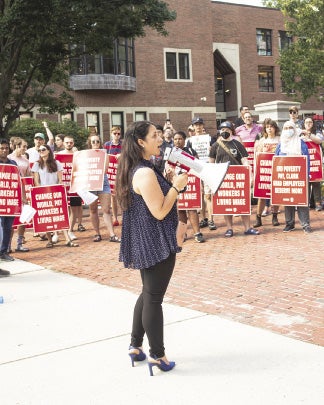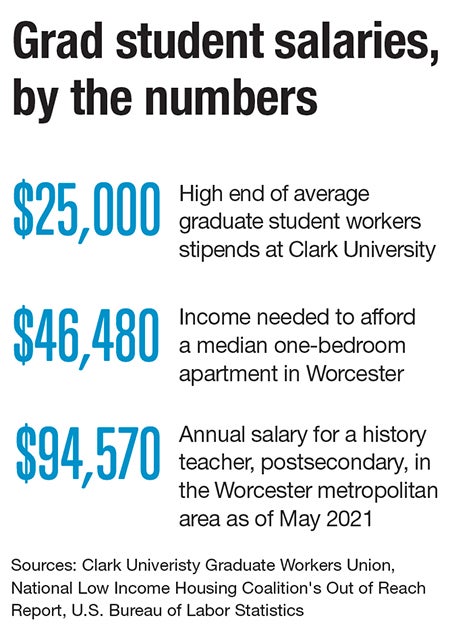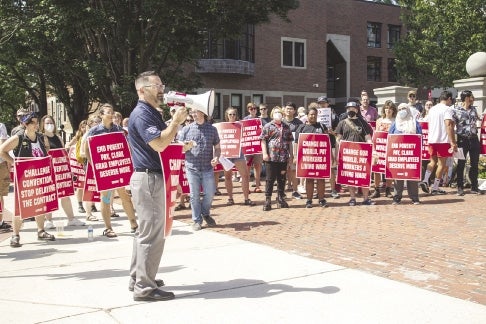The Clark graduate student union is part of a nationwide effort made possible by the President Joe Biden Administration’s decision to allow graduate students at private universities to unionize.
Get Instant Access to This Article
Subscribe to Worcester Business Journal and get immediate access to all of our subscriber-only content and much more.
- Critical Central Massachusetts business news updated daily.
- Immediate access to all subscriber-only content on our website.
- Bi-weekly print or digital editions of our award-winning publication.
- Special bonus issues like the WBJ Book of Lists.
- Exclusive ticket prize draws for our in-person events.
Click here to purchase a paywall bypass link for this article.
On Aug. 25, move-in day for incoming students at Clark University in Worcester, students and parents were greeted by demonstrators holding signs and chanting at the main entrance to the university.
The demonstrators were with the Clark University Graduate Workers United, a union seeking better wages, stipends, and health insurance coverage for the low-paying positions often considered halfway between students and professional workers.
“We want parents to understand the economic reality that the workers who are teaching their children face,” said William Westgard-Cruice, a PhD student in Clark’s geography department.
The Clark graduate student union is part of a nationwide effort made possible by the President Joe Biden Administration’s decision to allow graduate students at private universities to unionize. A similar effort is underway at Worcester Polytechnic Institute, and both follow the Massachusetts Department of Labor Relations certification in March 2021 giving doctors in training at UMass Medical School the ability to collectively bargain.
In unionizing, the graduate students are seeking better working conditions for roles often considered more apprenticeships than jobs and are fighting against long-held attitudes and political winds, keeping wages low.

Public vs. private university unions
Graduate student workers who are unionizing are generally teaching assistants and/or research assistants. They perform work such as teaching undergraduate classes and performing research under a principal investigator.
Graduate students at public universities and private universities face different challenges when unionizing. At public schools, workers are state employees and are subject to the labor laws of the state in which they operate. Private university workers are subject to federal laws and the National Labor Relations Board.

This makes things complicated, said Nafisa Tanjeem, associate professor of interdisciplinary studies at Worcester State University. There are different opinions on whether graduate student employees are primarily students or primarily workers. A lot has to do with politics.
Massachusetts and 13 other state allow graduate students to organize, while 23 specifically don’t allow it. In the remainder, state employees can organize but not necessarily graduate student workers and there may be restrictions on their ability to strike.
For private universities, the NLRB oversees labor organization, which means that judgements can shift from one presidential administration to another.
In 2004, the NLRB ruled against a group at Brown University in Rhode Island trying to organize with the argument that it would interfere with their education, according to The Chronicle of Higher Education. In August 2016, NLRB overruled the previous decision. Then in 2019, under the former President Donald Trump Administration, a new rule forbidding student workers from organizing was proposed, but in 2021 that proposed rule was withdrawn under the new Biden Administration.
This cleared the way for graduate students at Clark University, who started organizing in December 2020, to vote in March to form CUGWU with the support of the International Brotherhood of Teamsters Local 170 of Worcester.
The union is now negotiating for higher pay and for 100% of their members’ health insurance to be covered by the school. On Sept. 12, the union members authorized a strike if the union’s bargaining team deems it necessary.
At Clark, the graduate student stipends can range from $15,000 to $24,000 depending on the job and whether the worker is a teaching assistant or research assistant, according to Westgard-Cruice and Lauren Ashley Bradford, a doctoral student in the university’s department of Holocaust and Genocide Studies.
This pay is significantly below the $46,480 in annual salary a renter needs to afford a fair-market, one-bedroom apartment in Worcester, according to the National Low Income Housing Coalition’s 2022 Out of Reach report.
Because of the high cost of living, combined with low pay, graduate student unionization is a diversity, equity, and inclusion issue, said Bradford. People who come from privileged backgrounds might have access to outside sources of income, like family, while they complete their education, whereas people without access to outside funding may not choose to pursue advanced education because of the financial hardship.

WPI grad student union
Across town at Worcester Polytechnic Institute, graduate students are experiencing similar difficulties, and are similarly seeking to organize, said Sabine Hahn, a fifth-year PhD student in the biology and biotechnology department, and Andrew McReynolds, a second-year PhD student in the Department of Learning Sciences & Technology.

The WPI Graduate Worker Union, which is supported by the United Auto Workers, intends to vote for full unionization to be recognized by the NLRB before the end of the fall semester.
McReynolds and Hahn said the members of the union have been asking to meet with WPI administration to talk about issues, but they have yet to do so.
“Graduate students are an important part of the WPI community, and as a university committed to fostering a supportive and respectful learning and working environment, we look forward to listening, learning, and discussing related matters with them,” WPI said in a statement emailed to WBJ.

This movement to form a union at WPI started during the COVID pandemic in 2020 when a change in health insurance left the workers with a $550 bill for what they felt was a lower-quality plan, McReynolds said. They were also charged a $195 fee for the school to provide them with testing and protective supplies during the pandemic required for them to be on campus during the pandemic.
The first victory for the group came in spring 2021 when it advocated against the COVID fee and the school waived it.
Grad student workers at WPI receive a nine-month stipend of $24,345.
An apprenticeship
Not everyone is supportive of grad students’ effort to unionize, said Tanjeem. Opponents view graduate work as a form of apprenticeship, and Westgard-Cruice and Bradford said at Clark there is an attitude that graduate students must pay their dues.
The Clark graduate students are forming a union, in part, in order to break the pattern of one generation feeling they had to suffer and so must the next, said Westgard-Cruice.
At WPI, Hahn and McReynolds find younger faculty especially supportive of their efforts to organize.
The union has received advice and support from the American Association of University Professors chapter at WPI. Because of a 1980 U.S. Supreme Court ruling, National Labor Relations Board v. Yeshiva University, faculty at private universities can not organize. The AAUP is an advocacy group supporting academic professionals.
On Aug. 15, the Teamsters Local 170 filed a charge of unfair labor practices against Clark University on behalf of the grad students, stating that in response to unionization, the university had reneged on a promise to provide union employees with a full, 100% health insurance subsidy. It also stated that the university has refused to discuss wages and other economic items such as paid leave and insurance.
WBJ obtained a copy of the complaint through a Freedom of Information Act request from the NLRB.
Clark University administration did not respond to requests to speak about the union, nor about the strike vote.
Westgard-Cruice and Bradford said Clark is going against its strategic goals in not wanting to pay graduate student workers a living wage. They believe that the university will lose out on talent from all backgrounds that simply can’t afford to live while studying.
About three-quarters of classes are taught by adjunct faculty including graduate workers, making graduate students a key pool of labor for universities, said Tanjeem. The unionized students are working to receive what they feel is fair pay for their labor.
“We do love our jobs. We just want to make ends meet while doing the job,” Hahn said.
CORRECTION: A previous version of this story incorrectly said the Worcester Polytechnic Institute Graduate Worker Union had met with university administration to discuss labor issues. The union has asked to meet with administration, but the meeting has not taken place yet.

